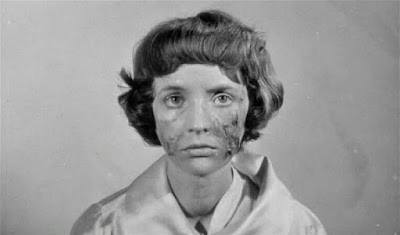... aka: Garu, the Mad Monk
Directed by:
Andy Milligan
My secret love affair with Andy Milligan (psst, don't tell anyone; I'm so ashamed!) continues with this hilariously overstuffed and ridiculous little zero budget wonder. Indicative of the director's usual style, there's enough plot for numerous movies crammed into just 56 minutes, some of the chintziest production values this side of an elementary school play, costumes and set dressings fashioned from fabrics typically reserved for the linen closet, a complete and utter disregard for the technical aspects of cinema and a cast of (mostly) amateurs trying and failing miserably to convince us that this takes place in Merry Ole England. As the film opens, we meet our poor heroine Nadja (Judith Israel) as she's being dragged through the streets and is then tossed into a cell. Months earlier, on her way to meet up with her boyfriend, Nadja had been kidnapped by a bunch of gypsies, who made her beg, steal and commit other crimes for them. She ended up pregnant by the main gypsy and, after giving birth to their stillborn infant, was abandoned. Guards found her attempting to bury the baby, accused her of killing it and now she's in prison awaiting her execution. Fortunately, her doofy boyfriend Carl (Paul Lieber), conveniently working as a guard where Nadja's being held, is around and promises to anything to free her. Unfortunately, he goes to the wrong place for help...
Carl immediately goes to the Church of Mortavia to consult monk Father Guru (the amusingly flamboyant Neil Flanagan), who also works overseeing the torture and execution of various criminals and peasants. After slapping him across the face for denouncing God, Guru tells Carl of a way they can rescue Nadja from her grim fate: by using a special potion that can make her appear dead until an antidote is administered to revive her. However, Guru's help doesn't come without a price. Strapped for money, the monk wants Carl to procure corpses for him so he can sell them to a medical school for fast cash as part of their agreement. Now not only indebted to the mad monk, Carl also finds himself having to help out witch Olga (Jaqueline Webb) in exchange for the death powder. She's Guru's former mistress and wants "blood, lots of blood..." for her vague "experiments." The plot goes off as planned; Nadja "dies" of a heart attack and is revived with the antidote. Guru has his mumbling, retarded, one-eyed hunchback assistant Igor (Jack Spencer) put her in the tower of the church until Carl can fulfill his obligations, which will entail three long months of body snatching.
Guru calls Igor "an ugly mass of flesh" and, when the hunchback begins to develop a crush on Nadja, he whips out his Miss Priss card; "God never intended for you to be loved by anyone! You were made to serve me and only me!" After dinner ("I hope you like horse. It's all we have."), Nadja tells Igor she'd like to be his friend. He gets flustered, screams and runs downstairs and starts furiously sweeping the floor with a broom. Not only a greedy hypocrite, Guru is also a serial murderer who slaughters innocent people who come into his church for no reason whatsoever. He suffers from schizophrenia, has two distinct personalities (virtuous and evil) and, during one hilarious and jaw-dropping scene, has an argument with himself in front of a mirror while clutching a bouquet of flowers. Now I'm starting to get a little impatient waiting to see Milligan's Fleshpot on 42nd Street (1973) to see Flanagan portray the role he was destined to play: a sassy drag queen.
To add more crazy hijinks, Guru's gal pal Olga the witch turns out to
actually be a vampire named "Noferatu" and crawls around on the
floor licking up blood after each murder.
In a torture chamber, mannequin hands and heads are chopped off and ping
pong ball eyes are gouged out. Other victims include a sailor, a pregnant
teenage runaway, an archbishop (Frank Echols) sent to check in on
things and Father Polanski (Gerald Jacuzzo), a possible successor of
Guru. There's a crucifixion, a tongue cut out with scissors, a hanging, a truly chaotic and rushed ending
and clothing, props and numerous other things that completely betray the
period setting. The editing and pacing are both
terrible and continuity is almost nonexistent. In other words, your usual
Milligan extravaganza. It was filmed at Saint Peter's Church in Manhattan on a budget of just 11,000 dollars.
Originally issued on VHS by Sinister Cinema, this is now apparently in the public domain and has been issued by numerous el cheapo outfits. The Retromedia DVD comes with a trailer and a 12-minute interview with
later Milligan collaborator Tony Vozza.
SBIG












































